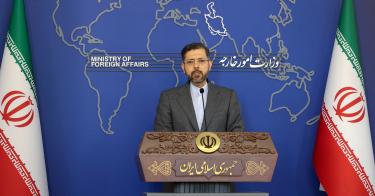Negotiations over a new nuclear deal with Iran have stalled. For now. But the talks are expected to resume. Policymakers would be wise to use this lull to take a sober look at the draft deal. They should pay particularly close attention to the dangerous regional consequences that would arise from another flawed deal with Iran.
As matters stand now, the new deal would be even worse than the original. Instead of the “stronger and longer” agreement we’d been promised, the deal now on the table is weaker and will shorten the time for Iran to become a nuclear power. Rather than prevent Iran from getting the bomb, it would pave the way for Tehran to become nuclear and empower its “sanction-free” global terroristic arm—the Islamic Revolutionary Guard Corps.
The most likely outcome of these developments would be a devastating regional war between Israel and Iran, as Tel Aviv tries to prevent Tehran from achieving its stated goal of wiping Israel from the earth. This war would inevitably expand, with Iran attacking Saudi Arabia and the United Arab Emirates.
Even if there is no immediate war, it is only logical that Turkey, Saudi Arabia and Egypt would think it necessary to acquire nuclear arsenals to deter Iran—a dangerous situation that could also lead to a nuclear war.
>>> Needed: An Effective Nuclear Energy Policy
Let’s consider the rosiest of scenarios with no war or nuclear proliferation. The deal would still release billions of dollars of frozen Iranian funds and lift the current sanctions against the regime. This will empower and embolden Iran’s Islamist dictatorship, just as it did after the original 2015 nuclear deal.
That agreement gave Tehran a windfall, which the regime promptly used to accelerate its uranium enrichment and ballistic missile program. Those funds also enabled the IRGC to escalate its military intervention in Syria and ramp up the transfer of advanced drones and missiles to a lethal network of proxy terror groups: Hezbollah, Hamas, Palestinian Islamic Jihad, Iraqi militias and the Houthi militants in Yemen. These anti-Western terrorist groups target civilians in Israel, Iraq, Saudi Arabia and the United Arab Emirates.
Make no mistake. The Iranian regime remains as staunchly anti-American as ever.
While Iranian diplomats have been engaged in nuclear talks in Vienna, Tehran has orchestrated a series of proxy attacks against U.S. forces in the region and Israel, Iraq, Saudi Arabia and the United Arab Emirates.
These attacks will likely increase after a new Iran deal. U.S. concessions on sanctions would subsidize Iran’s continuing military buildup, proxy terrorist network, internal repression and nuclear program.
Furthermore, the new Iran deal will strengthen Russian President Vladimir Putin, empower the economic and military alliance between Russia and Iran, and open up more ways for Russia to circumvent the U.S. and European sanctions imposed due to its invasion of Ukraine.
There is also the unsettling probability that the Biden administration will make the same mistake that the Obama administration made: Fail to adequately push back against Iran's destabilizing regional behavior after a nuclear agreement, however flawed, is reached.
Fearful of jeopardizing what it mistakenly considers a legacy achievement, the Biden administration may be even more inclined than it is now to treat Iran with kid gloves.
>>>Time to Come "Clean" on Nuclear Power
This complacent passivity will project weakness that could further encourage Iranian hardliners, undermine longstanding U.S. national interests, and demoralize U.S. allies in the region threatened by Iran’s aggressive regime and feel betrayed by the Biden administration.
Even worse, Russia and China would be two of the biggest beneficiaries of the deal outside of Iran. Moscow, which already has earned billions of dollars building Iran’s nuclear reactors, hopes to sell arms to Tehran for billions more. China, which signed a 25-year, $400 billion strategic partnership agreement with Tehran last year, will gain increased trade, easier access to a major source of oil imports, and a reinvigorated ally in a critical region.
What’s the alternative? The Biden administration needs to think outside the box. The U.S. cannot afford a prohibitively heavy price for a flawed nonproliferation agreement that amounts to little more than a diplomatic speed bump.
Instead, the U.S. should make every effort to deprive the Iranian regime and its terroristic arm of resources that can be used to advance its odious agenda. Simultaneously, Washington should support and encourage Israeli-Arab cooperation to build a breakfront of collective security and economic integration that stiff-arms Iranian expansion. The region also needs an integrated air and missile defense umbrella. There may also be a need for extended nuclear deterrence against a breakout Iranian nuclear threat.
The Middle East has long been a powder keg. The current deal would only make it bigger and shorten the fuse.
This piece originally appeared in The Washington Times




